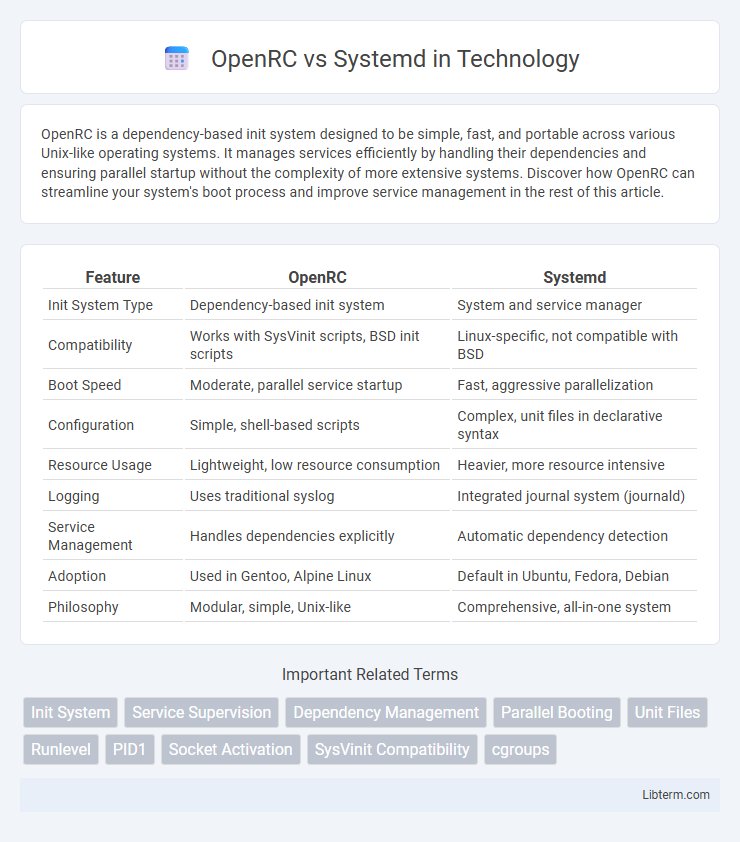OpenRC is a dependency-based init system designed to be simple, fast, and portable across various Unix-like operating systems. It manages services efficiently by handling their dependencies and ensuring parallel startup without the complexity of more extensive systems. Discover how OpenRC can streamline your system's boot process and improve service management in the rest of this article.
Table of Comparison
| Feature | OpenRC | Systemd |
|---|---|---|
| Init System Type | Dependency-based init system | System and service manager |
| Compatibility | Works with SysVinit scripts, BSD init scripts | Linux-specific, not compatible with BSD |
| Boot Speed | Moderate, parallel service startup | Fast, aggressive parallelization |
| Configuration | Simple, shell-based scripts | Complex, unit files in declarative syntax |
| Resource Usage | Lightweight, low resource consumption | Heavier, more resource intensive |
| Logging | Uses traditional syslog | Integrated journal system (journald) |
| Service Management | Handles dependencies explicitly | Automatic dependency detection |
| Adoption | Used in Gentoo, Alpine Linux | Default in Ubuntu, Fedora, Debian |
| Philosophy | Modular, simple, Unix-like | Comprehensive, all-in-one system |
Introduction to OpenRC and Systemd
OpenRC is a dependency-based init system designed for simplicity and speed, primarily used in Gentoo and Alpine Linux, while Systemd is a more complex and feature-rich init system widely adopted by major distributions like Fedora, Ubuntu, and Debian. OpenRC focuses on maintaining traditional Unix init script compatibility and service supervision without replacing core system components, whereas Systemd provides integrated management of system services, logging, and device control. Both aim to manage system initialization and service processes but differ significantly in architecture, complexity, and ecosystem integration.
Core Architecture Overview
OpenRC is a dependency-based init system that uses a modular approach, relying on traditional Unix shell scripts for service management, allowing for flexibility and simplicity in service handling. Systemd features a more complex daemon-based architecture with parallel service startup, dependency tracking through unit files, and integrated features like journaling and socket activation. OpenRC's design prioritizes speed and minimalism, while Systemd emphasizes comprehensive system management and tighter integration with modern Linux distributions.
Boot and Service Management
OpenRC uses a dependency-based init system with parallel service startup to optimize boot times, relying on simple scripts and runlevels for service management. Systemd offers aggressive parallelization and socket activation, significantly reducing boot time while centralizing service management using unit files. Both systems handle service dependencies, but Systemd integrates tightly with Linux kernel features, providing more granular control over boot and service states.
Dependency Handling
OpenRC manages service dependencies through simple parallel or sequential starting based on explicit dependency declarations using runlevels and startup scripts. Systemd uses a complex dependency graph with unit files defining precise requirements, allowing parallel startup of services while respecting dependencies and conditions. This results in Systemd providing more dynamic and fine-grained control over service startup order compared to OpenRC's straightforward, script-based approach.
Performance Comparison
OpenRC typically offers faster boot times and lower system resource usage compared to Systemd due to its simpler, dependency-based initialization approach. Systemd, while more feature-rich with parallel service startup and advanced logging, can introduce higher CPU and memory overhead during system boot. Performance benchmarks often show OpenRC excels in lightweight environments, whereas Systemd benefits complex systems needing extensive service management.
Customization and Flexibility
OpenRC offers extensive customization through simple, script-based service definitions that allow administrators to tailor initialization processes with minimal overhead. Systemd provides a complex dependency management system and integrates tightly with the kernel, enabling advanced features but often limiting flexibility due to its monolithic design. While OpenRC excels in lightweight, modular service control ideal for custom environments, Systemd's unified framework supports extensive system management at the cost of less straightforward customization.
System Resource Usage
Systemd typically consumes more system resources compared to OpenRC due to its feature-rich architecture integrating numerous services and dependencies natively. OpenRC is designed to be lightweight and minimalistic, leading to lower CPU and memory usage especially on systems with limited resources. Benchmark tests consistently show OpenRC reduces boot time and overall system overhead, making it favorable for performance-sensitive environments.
Security Features
OpenRC enhances security through its simple and modular design, minimizing the attack surface by avoiding complex dependencies and limiting privilege escalation paths. Systemd offers extensive security features such as sandboxing, resource control with cgroups, and SELinux integration, enabling fine-grained access control and isolation of services. While Systemd provides a comprehensive security framework, OpenRC's lightweight approach favors environments requiring minimal complexity and reduced security risks from systemd's larger codebase.
Community and Distribution Support
OpenRC boasts strong community support within Gentoo and Alpine Linux, appreciated for its simplicity and modularity, making it a favorite in lightweight and security-conscious distributions. Systemd enjoys widespread adoption across major distributions like Fedora, Ubuntu, and Debian, backed by extensive developer contributions and corporate sponsorship, ensuring robust feature development and maintenance. The choice between OpenRC and Systemd often hinges on community preference for system complexity and the distribution's ecosystem requirements.
Choosing the Right Init System
Choosing the right init system between OpenRC and Systemd depends on factors like system complexity, resource usage, and user preference for simplicity or advanced features. OpenRC offers a lightweight, script-based init system ideal for performance-focused environments and ease of customization. Systemd provides comprehensive service management with parallel startup and extensive dependencies, suitable for modern Linux distributions requiring robust system control and integration.
OpenRC Infographic

 libterm.com
libterm.com